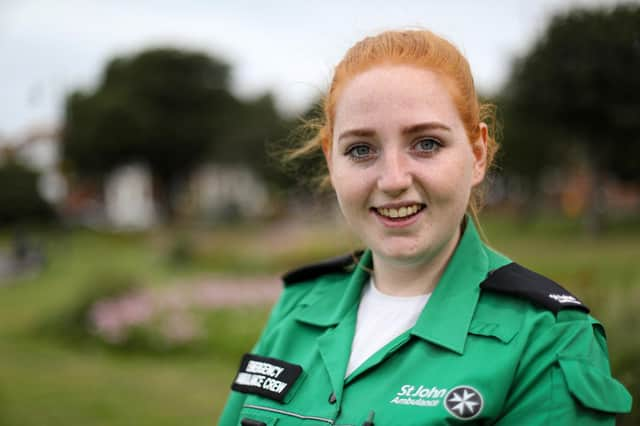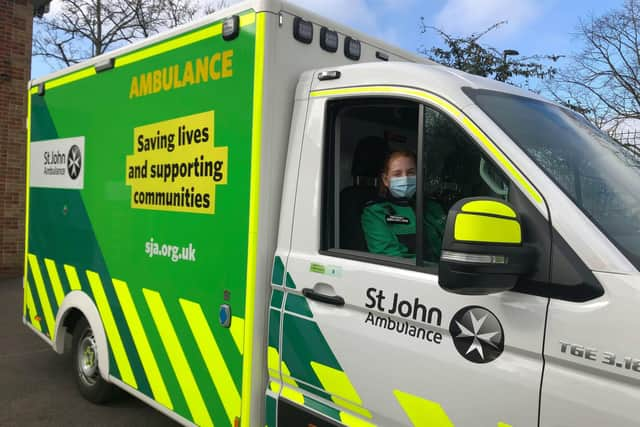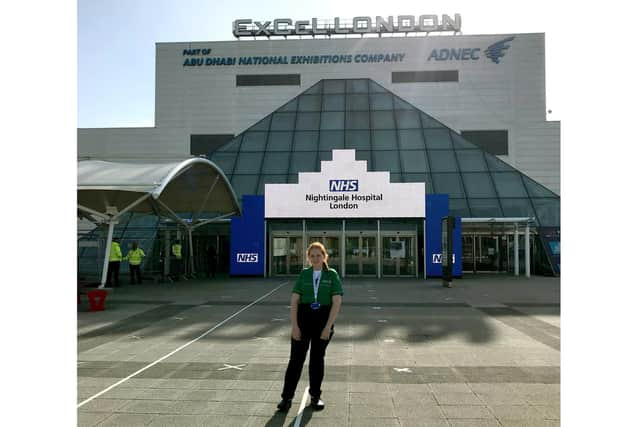Portsmouth student's top award for splitting time between Covid frontline and writing essays


Amy, 20, worked long shifts as a St John Ambulance crew member while balancing a busy work schedule for her photography course at Portsmouth University.
It was intense and often non-stop. More often than not, she wouldn't get a break.
Advertisement
Hide AdAdvertisement
Hide AdShe says: 'You'd come home from a 12-hour shift and then be writing an essay for uni.


‘It was hard, but it was rewarding, and being able to help patients kept you going.
‘It was difficult, and it was intense, and it was non-stop.
‘All our shifts would overrun because there was just patient after patient.
‘You never seemed to finish on time.


‘Days were long, yes, and often you'd go without breaks because you just couldn't.
‘There were too many patients to deal with.’
Amy's dedication didn't stop there.
Advertisement
Hide AdAdvertisement
Hide AdShe also worked a month of ‘alien’ and ‘difficult’ shifts at one of the UK's seven Nightingale hospitals at The ExCeL in East London, which had the potential to hold 4,000 patients at the height of the pandemic.
The unit manager of the Portsmouth university volunteer unit even helped out at St James' Vaccination Centre in Portsmouth.
Fast forward to today, and her hard work and dedication to serving on the frontline has won her a Vice Chancellor's Award for Excellence from the University of Portsmouth, with the official ceremony taking place later this month.
The awards celebrate the work of their staff and students’ extraordinary efforts during the Covid-19 pandemic.
Advertisement
Hide AdAdvertisement
Hide AdFor Amy, her volunteering efforts totalled a whopping 1,300 hours. By the end of the year, she hopes to have extended that to 1,500.
Amy's award is for working a month at the London Nightingale Hospital, as well as her time at St James' Vaccination Centre in Portsmouth and as an emergency crew member with St John Ambulance.
While working at London Nightingale, Amy met doctors, nurses, and dentists who had travelled from all over the country to meet the capacity necessary to treat Covid patients.
Thrust together from across the UK, hardly anybody knew each other before they worked alongside each other, which was completely surreal for Amy, as in a hospital, ‘you knew your team.’
But this was a new experience for everybody.
Advertisement
Hide AdAdvertisement
Hide AdAmy, originally from south Wales, describes it as a ‘one-off life experience’ that she hopes will never happen again.
But as Amy explains the team bonded in adversity: 'It was difficult, it was full-on, and it was very alien.
‘It's an environment that no one had been in before.
‘In most cases, people from all across different hospitals who didn't know each other came together and were working together.
‘We had all sorts of people from all different parts of London, other areas even outside of London coming to help, and the community spirit was massive.
Advertisement
Hide AdAdvertisement
Hide Ad‘Most of us were staying in hotels nearby, and we were just living there.
‘We'd all eat food together. We'd spend most of our time with all these people we'd never met, and we made lifelong friends out of it, and that's kind of what pulled us through.
‘We spent any time off that we had on walks with other people to try and get some fresh air and unwind a bit because it was just so busy inside.
‘It was difficult, but it was incredible just to see all these teams of people pull together and just crack on with the job and get things done and do it really well.’
Advertisement
Hide AdAdvertisement
Hide AdOne of Amy's most privileged opportunities was sitting with a patient during their end of life care while volunteering at a hospital.
Their family members were unable to be with them due to Covid restrictions at the time.
Amy sat and held a patient's hand as they passed away, for which their family were ‘enormously thankful’.
‘It was one of these things that you never expect to be doing.
Advertisement
Hide AdAdvertisement
Hide Ad‘But it was a massive privilege that I was there to look after this person in their final moments, and they were enormously thankful for me because they had no one else.’
Despite not feeling stressed by the gruelling demands on the front line, for her team, the pressures were real, and the waits for ambulances were huge.
She explains: ‘A lot of the time during Covid, patients were so unwell that we were taking most of them to hospital.
‘We spend a lot of time talking to patients trying to work out why things have gone wrong, what's going on.
Advertisement
Hide AdAdvertisement
Hide Ad‘People have all sorts of issues; it's not just blood everywhere and stuff like that that you see on the TV, there's all sorts of things going on.
‘There are social problems at home. There might be some packages of care like carers coming in, and you need to deal with all sorts of things.
‘Mental health issues are very complicated, like domestic abuse that's going on in the house because during Covid, that spiked.
‘There are all sorts, so it's just kind of talking to your patients, working out what's going on as best as you can, dealing with the patient, taking them to the right place for them, and then starting all over again with the next one.
Advertisement
Hide AdAdvertisement
Hide Ad‘We drive to the next patient and deal with them, and during Covid, the waits for ambulances were huge, so only the sickest of patients were really getting ambulances.
‘The rest were told to make their own way to hospital.’
The network of people that pulled together in such a short period of time in a rush to care for extremely ill patients has had a huge impact on Amy and it’s something she will never forget.
She's met people she'd never have encountered before that through the pandemic and, going forward, will be willing to support her if she ever needed it.
After university, Amy plans to continue working for the ambulance service. She says: ‘It's now become a big part of my life, and it's something I really enjoy doing, so it's definitely on the cards.’
Advertisement
Hide AdAdvertisement
Hide AdFor more information on St John Ambulance and how to get involved, go to sja.org.uk.
A message from the editor, Mark Waldron.
You can subscribe here for unlimited access to our online coverage, including Pompey, for 27p a day.
Comment Guidelines
National World encourages reader discussion on our stories. User feedback, insights and back-and-forth exchanges add a rich layer of context to reporting. Please review our Community Guidelines before commenting.